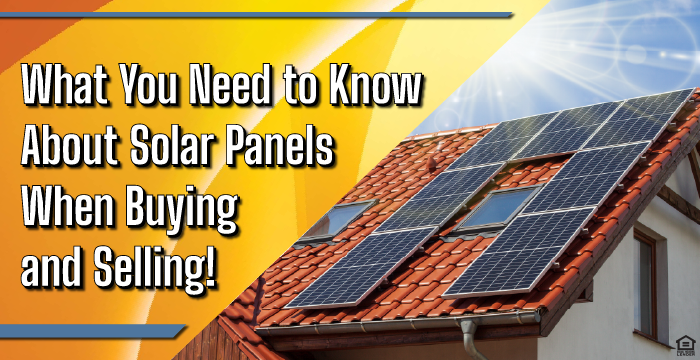
What You Need to Know About Homes with Solar Panels When Buying and Selling

Solar panels are a great way to become more environmentally-friendly while saving on your energy bills. Some homeowners have even generated enough electricity to sell some of it back to their power company. Solar panels can be outright owned, leased, financed, or subject to a Power Purchase Agreement (PPA), which is why it’s important to know that the high initial costs of the system can create some unexpected obstacles if you’re looking to buy or sell a home with solar panels.
Buying a Home with Fully-Owned Solar Panels
If you’re looking for a home with solar panels, you’ll need to be sure that the panels are included with the sale. Many lease agreements allow current owners to remove the panels and install them at a new property, so buying a home with a fully-owned system would be your ideal plan.
If the solar panels are owned outright and there is no loan, they are treated as a fixture of the property and are sold as part of the real estate.
Keep in mind that solar panels cannot be the only source of electricity on the property. All major mortgage investors, including Fannie Mae, Freddie Mac, the VA, and the FHA, require the property to have another source of electricity in case the solar panel system fails.
Your lender may require a copy of the paid-in-full contract and a satisfactory borrower or attorney confirming the contract. With that in mind, Property Appraisals will reference the existence of solar panels, but cannot give a specific value to the panels until it is proven that the panels are owned.
How Leases, Loans, and Power Purchase Agreements Affect Homes with Solar Panels
If you are buying a home with solar panels that are not fully owned, a copy of the lease, loan, or PPA must be provided to your lender.
For purchase transactions, the lease, loan agreement, or PPA needs to be transferred to the borrower with a fully-signed Transfer Agreement. Signing by the solar company can be a closing condition.
If there is a loan for solar panels associated with a home, the loan itself goes with the property as a lien, and must be transferable to the new buyer.
Solar loans, leases, or PPA’s are usually submitted as a Uniform Commercial Code (UCC) filing. A UCC filing serves as an official public notice stating a creditor’s interest in a piece of property, such as solar panels, as collateral for a debt.
If a UCC has been filed, it must be cleared by the title company to ensure the mortgage’s first lien status. A UCC termination is required unless the title company confirms that the UCC is for fixtures only and can remain on the title. If not, a UCC termination or subordination is required.
Prepare for Liens if Solar Panels Aren’t Outright Owned
If you’re not paying for your solar panels outright with cash, the manufacturer may have placed a lien on the property to ensure that you continue paying for them.
Solar loans, leases, or PPA’s are usually submitted as a UCC filing. If a UCC has been filed, it must be cleared by the title company to ensure the mortgage’s first lien status. A UCC termination is required unless the title company confirms that the UCC is for fixtures only and can remain on the title. If not, a UCC termination or subordination is required.
Any lien that has been filed in connection with the panels must be subordinated to the mortgage at closing or it must be removed of record and can be re-filed after closing. While some manufacturers will temporarily remove the lien in the case of a sale, if you are still paying off the balance of the solar panels, there could be a lien on the home until the system is fully paid off.
Qualifying for a Mortgage with a Solar Panel Lease Payment
If you’re making a monthly lease payment for your solar panels, this payment is included in your debt-to-income (DTI) ratio during the mortgage qualification process. However, if your payments are subject to a Power Purchase Agreement (PPA), they do not have to be included in your DTI.
These monthly lease payments can be excluded from your DTI under very specific circumstances:
- If the lease agreement guarantees a specific amount of energy over a given timeframe and the solar panels have failed to meet those goals, the lease payments may be excluded from your DTI.
- If you pay a rate based on usage of your solar panels, much like other utilities, it may be excluded from your DTI.
If you’re currently financing your solar panels, any payments must be included in your debt-to-income ratio. These payments are accounted for like any other debt, so it’s important to recognize that larger loans (with larger payment amounts) can lower the size of mortgage you can qualify for.
Closing Thoughts
Solar panels are an attractive addition for many homes and being an educated buyer means that you’re prepared for every circumstance. However, it’s important to weigh the pros and cons of a solar panel system, especially if it isn’t fully-owned. Always check with your lender to know what needs to be provided, and how solar panels can affect how you qualify for a loan.